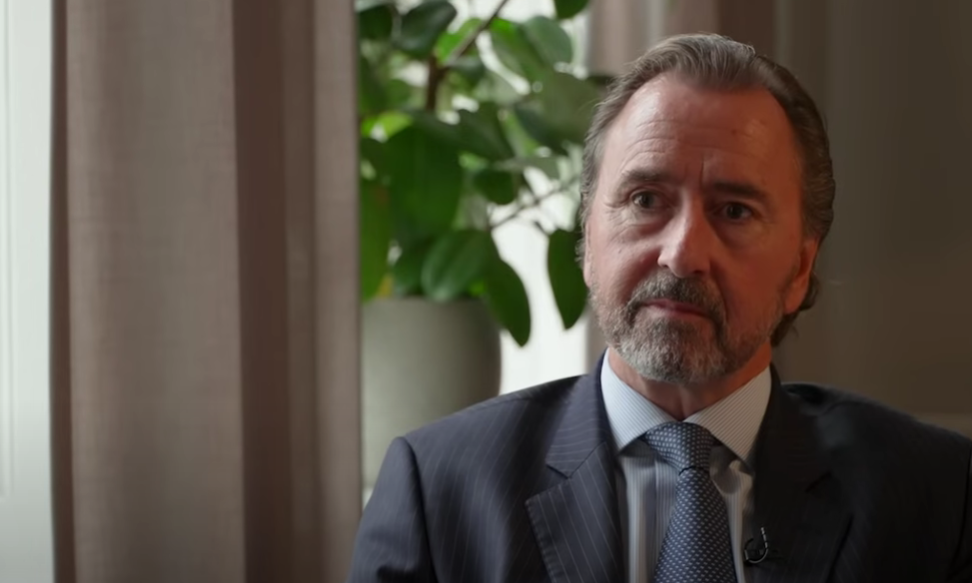Marknadsnyheter
Imfinzi plus Imjudo demonstrated unprecedented overall survival in advanced liver cancer with one in five patients surviving five years in HIMALAYA Phase III trial
Longest survival follow-up ever reported for a Phase III immunotherapy trial in this setting.
Updated results from the HIMALAYA Phase III trial showed AstraZeneca’s Imfinzi (durvalumab) plus Imjudo (tremelimumab) demonstrated a sustained, clinically meaningful overall survival (OS) benefit at five years for patients with unresectable hepatocellular carcinoma (HCC) who had not received prior systemic therapy and were not eligible for localised treatment.
These results from HIMALAYA will be presented today at the European Society for Medical Oncology (ESMO) Congress 2024 in Barcelona, Spain (presentation 947MO).
At five years of follow-up, this latest exploratory analysis showed that a single priming dose of Imjudo added to Imfinzi, called the STRIDE regimen (Single Tremelimumab Regular Interval Durvalumab), reduced the risk of death by 24% compared to sorafenib (based on a hazard ratio [HR] of 0.76; 95% confidence interval [CI] 0.65-0.89). An estimated 19.6% of patients treated with the STRIDE regimen were alive at five years versus 9.4% of those treated with sorafenib.
In a subgroup analysis of patients in the trial who achieved disease control, defined as complete or partial response or stable disease, 28.7% of those treated with the STRIDE regimen were alive at five years versus 12.7% of patients treated with sorafenib. In addition, an exploratory analysis of depth of response (DpR) showed that more patients treated with the STRIDE regimen experienced deep responses leading to longer survival compared to sorafenib.
Lorenza Rimassa, MD, Associate Professor of Medical Oncology, Humanitas University and IRCCS Humanitas Research Hospital, Milan, Italy and a lead investigator in the HIMALAYA trial, said: “Treatment with durvalumab plus tremelimumab for patients with advanced liver cancer doubled the overall survival rate at five years, a significant survival advantage over sorafenib that has also become even more pronounced over time. These data reinforce the use of this novel dual immunotherapy regimen and are an important milestone for patients with this devastating disease.”
Sarah Manes, Liver Cancers Program Director at Global Liver Institute, said: “Reaching the five-year survival milestone is both clinically significant and emotionally meaningful for people with advanced liver cancer and their families. We are thrilled to see this progress in improving outcomes with new treatment options, bringing new hope for long-term survivorship to patients in our community.”
Susan Galbraith, Executive Vice President, Oncology R&D, AstraZeneca, said: “It is remarkable to see nearly 20 per cent of patients with advanced liver cancer treated with the STRIDE regimen alive at five years compared to only about seven per cent of patients living that long historically. This is a major step forward, setting a new survival benchmark. This underscores our commitment to following patients for the long term to help us better characterise the enduring clinical benefits of this innovative priming approach with an anti-CTLA-4 antibody added to PD-L1 blockade.”
Summary of updated survival results: HIMALAYA
| OSi, ii | STRIDE(n=393) | Sorafenib (n=389) |
| Median duration of follow-up, in months (95% CI) | 62.5 (59.5-64.8) | 59.9 (58.3-61.5) |
| OS HR (95% CI) | 0.76 (0.65-0.89) | |
| p-value (2-sided)iii | 0.0008 | |
| OS rateiv at 60 months (95% CI), % | 19.6 | 9.4 |
| DC at 60 monthsNumber of patientsOS rate, % | 4328.7 | 1712.7 |
| DpRv >75% at 60 monthsNumber of patientsOS rateiv, % | 2772.7 | 333.3 |
| DpRv >50%–≤75% at 60 monthsNumber of patientsOS rateiv, % | 3457.8 | 1232.1 |
| i. Updated analysis data cut-off: 01 March 2024, with 82% OS data maturityii. OS HRs and 95% CIs were calculated using a Cox proportional hazards model adjusting for treatment, aetiology, ECOG performance status, and macrovascular invasion iii. Nominal p-valueiv. OS rates at 60 months were estimated using Kaplan-Meier methodv. DpR represents the percentage of tumor shrinkage from baseline observed at the time of best objective response evaluation | ||
The safety profile of the STRIDE regimen was consistent with the known profiles of each medicine, and no new safety signals were observed with longer follow-up. Serious treatment-related adverse events, defined as Grade 3 or 4 and including death, were experienced by 17.5% of patients treated with the STRIDE regimen versus 9.9% of patients treated with sorafenib, with no new events occurring after the primary analysis for STRIDE.
Imfinzi in combination with Imjudo is approved for the treatment of adults with advanced or unresectable HCC in the US, EU (in the 1st-line setting), Japan and several other countries. Imfinzi monotherapy is also approved in Japan in this setting.
Notes
Liver cancer
Liver cancer, of which HCC is the most common type, is the third-leading cause of cancer death, with nearly 900,000 people worldwide diagnosed each year and a high prevalence in certain regions of Asia.1-2 An estimated 80-90% of all patients with HCC also have cirrhosis. Chronic liver diseases such as cirrhosis are associated with inflammation that over time can lead to the development of HCC.3
Advanced-stage HCC prognosis is poor, with a five-year survival rate of only 7%.4 More than half of patients are diagnosed at advanced stages of the disease, often when symptoms first appear.5 The unique immune environment of liver cancer provides clear rationale for investigating medications that harness the power of the immune system to treat HCC.5
HIMALAYA
HIMALAYA is a randomised, open-label, multi-centre, global Phase III trial of Imfinzi monotherapy and a regimen comprising a single priming dose of Imjudo 300mg added to Imfinzi 1500mg followed by Imfinzi every four weeks (STRIDE regimen) versus sorafenib, a standard-of-care multi-kinase inhibitor.
The trial included a total of 1,324 randomised patients with unresectable, advanced HCC who had not been treated with prior systemic therapy and were not eligible for locoregional therapy (treatment localised to the liver and surrounding tissue).
The trial was conducted in 181 centres across 16 countries, including in the US, Canada, Europe, South America and Asia. The primary endpoint was OS for the combination versus sorafenib and key secondary endpoints included OS for Imfinzi versus sorafenib, objective response rate and progression-free survival (PFS) for the combination and for Imfinzi alone.
Imfinzi
Imfinzi (durvalumab) is a human monoclonal antibody that binds to the PD-L1 protein and blocks the interaction of PD-L1 with the PD-1 and CD80 proteins, countering the tumour’s immune-evading tactics and releasing the inhibition of immune responses.
Imfinzi is approved in combination with chemotherapy (gemcitabine plus cisplatin) in locally advanced or metastatic biliary tract cancer (BTC) and in combination with Imjudo (tremelimumab) in unresectable HCC. Imfinzi is also approved as a monotherapy in unresectable HCC in Japan and the EU and in combination with chemotherapy (carboplatin plus paclitaxel) followed by Imfinzi monotherapy in primary advanced or recurrent endometrial cancer that is mismatch repair deficient in the US.
In addition to its indications in gastrointestinal (GI) cancers, Imfinzi is the global standard of care in the curative-intent setting of unresectable, Stage III non-small cell lung cancer (NSCLC) in patients whose disease has not progressed after chemoradiotherapy. Imfinzi is also approved for the treatment of extensive-stage small cell lung cancer (SCLC) and in combination with a short course of Imjudo and chemotherapy for the treatment of metastatic NSCLC. In limited-stage SCLC, Imfinzi demonstrated statistically significant and clinically meaningful improvements in the dual primary endpoints of OS and PFS compared to placebo in patients who had not progressed following standard-of-care concurrent chemoradiotherapy in the ADRIATIC Phase III trial.
Imfinzi in combination with neoadjuvant platinum-containing chemotherapy before surgery and as adjuvant monotherapy after surgery has been approved for patients in the US and several other countries for the treatment of adult patients with resectable NSCLC and no known epidermal growth factor receptor mutations or anaplastic lymphoma kinase rearrangements.
Imfinzi plus chemotherapy followed by Imfinzi alone was recently approved in the US for mismatch repair deficient patients with primary advanced or recurrent endometrial cancer. This regimen was also approved in the EU, in addition to Imfinzi plus chemotherapy followed by Imfinzi and Lynparza (olaparib) for mismatch repair proficient patients.
In muscle-invasive bladder cancer, Imfinzi in combination with chemotherapy demonstrated a statistically significant and clinically meaningful improvement in the primary endpoint of event-free survival and the key secondary endpoint of OS versus neoadjuvant chemotherapy in the NIAGARA Phase III trial.
Since the first approval in May 2017, more than 220,000 patients have been treated with Imfinzi. As part of a broad development programme, Imfinzi is being tested as a single treatment and in combinations with other anti-cancer treatments for patients with SCLC, NSCLC, bladder cancer, breast cancer, several GI and gynaecologic cancers and other solid tumours.
Imjudo
Imjudo (tremelimumab) is a human monoclonal antibody that targets the activity of cytotoxic T-lymphocyte-associated protein 4 (CTLA-4). Imjudo blocks the activity of CTLA-4, contributing to T-cell activation, priming the immune response to cancer and fostering cancer cell death. In addition to its approved indications in liver and lung cancers, Imjudo is being tested in combination with Imfinzi across multiple tumour types including locoregional HCC (EMERALD-3), SCLC (ADRIATIC) and bladder cancer (VOLGA and NILE).
AstraZeneca in GI cancers
AstraZeneca has a broad development programme for the treatment of GI cancers across several medicines and a variety of tumour types and stages of disease. In 2022, GI cancers collectively represented approximately 4.9 million new cancer cases leading to approximately 3.3 million deaths.6
Within this programme, the Company is committed to improving outcomes in gastric, liver, biliary tract, oesophageal, pancreatic and colorectal cancers.
In addition to its indications in BTC and HCC, Imfinzi is being assessed in combinations, including with Imjudo, in liver, oesophageal and gastric cancers in an extensive development programme spanning early to late-stage disease across settings.
The Company is also assessing rilvegostomig (AZD2936), a PD-1/TIGIT bispecific antibody, in combination with chemotherapy as an adjuvant therapy in BTC and as a 1st-line treatment in patients with HER2-negative, locally advanced unresectable or metastatic gastroesophageal junction cancers.
Enhertu (trastuzumab deruxtecan), a HER2-directed antibody drug conjugate, is approved in the US, China and several other countries for HER2-positive advanced gastric cancer and is being assessed in colorectal cancer. It also has been assessed in multiple GI settings including BTC in the DESTINY-PanTumor02 Phase II trial, and it was recently approved in the US for the treatment of unresectable or metastatic HER2-positive solid tumours who have received prior systemic treatment and have no satisfactory alternative treatment options. Enhertu is jointly developed and commercialised by AstraZeneca and Daiichi Sankyo.
Lynparza (olaparib), a first-in-class PARP inhibitor, is approved in the US, EU and several other countries for the treatment of BRCA-mutated metastatic pancreatic cancer. Lynparza is developed and commercialised in collaboration with MSD (Merck & Co., Inc. inside the US and Canada).
AstraZeneca is advancing multiple modalities that provide complementary mechanisms for targeting Claudin 18.2, a promising therapeutic target in gastric cancer. These include AZD0901, a potential first-in-class antibody drug conjugate licensed from KYM Biosciences Inc., currently in Phase III development; AZD5863, a novel Claudin 18.2/CD3 T-cell engager bispecific antibody licensed from Harbour Biomed in Phase I development; and AZD6422, an armoured autologous chimeric antigen receptor T cell (CAR-T) therapy, currently being evaluated in an Investigator Initiated Trial (IIT) in collaboration with AbelZeta in China.
In early development, AstraZeneca is developing two Glypican 3 (GPC3) armoured CAR-Ts in HCC. AZD5851, currently in Phase I development, is being developed globally, and C-CAR031 / AZD7003 is being co-developed with AbelZeta in China where it is under evaluation in an IIT.
AstraZeneca in immuno-oncology (IO)
AstraZeneca is a pioneer in introducing the concept of immunotherapy into dedicated clinical areas of high unmet medical need. The Company has a comprehensive and diverse IO portfolio and pipeline anchored in immunotherapies designed to overcome evasion of the anti-tumour immune response and stimulate the body’s immune system to attack tumours.
AstraZeneca strives to redefine cancer care and help transform outcomes for patients with Imfinzi as a monotherapy and in combination with Imjudo as well as other novel immunotherapies and modalities. The Company is also investigating next-generation immunotherapies like bispecific antibodies and therapeutics that harness different aspects of immunity to target cancer, including cell therapy and T-cell engagers.
AstraZeneca is pursuing an innovative clinical strategy to bring IO-based therapies that deliver long-term survival to new settings across a wide range of cancer types. The Company is focused on exploring novel combination approaches to help prevent treatment resistance and drive longer immune responses. With an extensive clinical programme, the Company also champions the use of IO treatment in earlier disease stages, where there is the greatest potential for cure.
AstraZeneca in oncology
AstraZeneca is leading a revolution in oncology with the ambition to provide cures for cancer in every form, following the science to understand cancer and all its complexities to discover, develop and deliver life-changing medicines to patients.
The Company’s focus is on some of the most challenging cancers. It is through persistent innovation that AstraZeneca has built one of the most diverse portfolios and pipelines in the industry, with the potential to catalyse changes in the practice of medicine and transform the patient experience.
AstraZeneca has the vision to redefine cancer care and, one day, eliminate cancer as a cause of death.
AstraZeneca
AstraZeneca (LSE/STO/Nasdaq: AZN) is a global, science-led biopharmaceutical company that focuses on the discovery, development, and commercialisation of prescription medicines in Oncology, Rare Diseases, and BioPharmaceuticals, including Cardiovascular, Renal & Metabolism, and Respiratory & Immunology. Based in Cambridge, UK, AstraZeneca’s innovative medicines are sold in more than 125 countries and used by millions of patients worldwide. Please visit astrazeneca.com and follow the Company on social media @AstraZeneca.
Contacts
For details on how to contact the Investor Relations Team, please click here. For Media contacts, click here.
References
- World Health Organization. Liver Cancer Fact Sheet. Available at: https://gco.iarc.who.int/media/globocan/factsheets/cancers/11-liver-and-intrahepatic-bile-ducts-fact-sheet.pdf. Accessed September 2024.
- Liu Y, et al. Changes in the Epidemiology of Hepatocellular Carcinoma in Asia. Cancers (Basel). 2022;14(18):4473.
- Tarao K, et al. Real impact of liver cirrhosis on the development of hepatocellular carcinoma in various liver diseases—meta‐analytic assessment. Cancer Med. 2019;8(3):1054-1065.
- Sayiner M, et al. Disease Burden of Hepatocellular Carcinoma: A Global Perspective. Digestive Diseases and Sciences. 2019;64: 910-917.
- Colagrande S, et al. Challenges of advanced hepatocellular carcinoma. World J Gastroenterol. 2016;22(34):7645-7659.
- World Health Organization. Cancer factsheets: Digestive organs (oesophagus, anus, stomach, colon, rectum, liver and intrahepatic bile ducts, pancreas, gallbladder). Available at: https://gco.iarc.fr/today/en/fact-sheets-cancers. Accessed September 2024.
Marknadsnyheter
JRS chefsstrateg Torbjörn Söderberg om börsen framåt

JRS chefsstrateg Torbjörn Söderberg pratar med Jesper Norberg på EFN om börsens väg framåt. Man tar upp värderingar och makro, samt hur han själv väljer att agera.
Marknadsnyheter
Kreditkort skapar problem för USAs konsumenter – CNBC granskar

CNBC tittar närmare på hur kreditkort skapar problem för konsumenterna i USA som får betala räntor på upp till 36 %, och ovanpå det kommer nya avgifter. När det skapar så här stora problem blir det ett problem för ekonomin som helhet, det är inte bara ett individuellt problem.
CNBC granskar kreditkort och problemen de skapar
Vi skrev nyligen om rekordhög belåning hos investerare i USA. Det är samma sak här, när det är så många individer som är så hårt belånade blir det ett problem för hela aktiemarknaden.
Marknadsnyheter
Varför går det så dåligt för Las Vegas?

Det pratas mycket om att Las Vegas har blivit tomt. Det kommer färre besökare både från USA och utlandet, i en sådan omfattning att vägar som förut var fyllda med bilar nu är smidiga att ta sig fram på. De enda som fortsatt verkar komma är affärsresenärerna.
Las Vegas får mycket kritik för att ha blivit för giriga. Hotellen har börjat lägga på alla möjliga konstiga avgifter för att tjäna mer, restaurangerna lägger på avgifter och dessutom har det tillkommit flera nya skatter. Besökarna känner sig lurade.
-
Analys från DailyFX10 år ago
EUR/USD Flirts with Monthly Close Under 30 Year Trendline
-
Marknadsnyheter5 år ago
BrainCool AB (publ): erhåller bidrag (grant) om 0,9 MSEK från Vinnova för bolagets projekt inom behandling av covid-19 patienter med hög feber
-

 Marknadsnyheter3 år ago
Marknadsnyheter3 år agoUpptäck de bästa verktygen för att analysera Bitcoin!
-
Analys från DailyFX12 år ago
Japanese Yen Breakout or Fakeout? ZAR/JPY May Provide the Answer
-

 Marknadsnyheter2 år ago
Marknadsnyheter2 år agoDärför föredrar svenska spelare att spela via mobiltelefonen
-
Analys från DailyFX12 år ago
Price & Time: Key Levels to Watch in the Aftermath of NFP
-
Analys från DailyFX8 år ago
Gold Prices Falter at Resistance: Is the Bullish Run Finished?
-

 Nyheter7 år ago
Nyheter7 år agoTeknisk analys med Martin Hallström och Nils Brobacke

